
Esta resenha pode conter spoilers
"It takes time to get used to things"
Chungking Express is more a mood than a story, more style than substance but an entertaining and colorful watch. Lonely and heartbroken people brush up to the edge of madness as they look for love or try to reclaim it. Lives touch briefly with unexpected outcomes.In the first short story, Officer #223 is attempting to win back his girlfriend May, unable to move on. Most evenings he hangs out at the snack bar using the pay phone to try and get in touch with her through relatives and friends. Each day he purchases a can of pineapple with the expiration date of May 1, coincidentally his birthday, and vows after eating thirty of them if she hasn't come back, he will move on. His love lines cross paths with Brigitte Lin's Blonde Wig Woman who is a drug dealer and smuggler who has been double-crossed by the trafficking mules she has prepared.
The whole May 1 expiration date bit was too on the nose, feeling more and more contrived as the bit went along. Brigitte Lin in sunglasses, a trench coat and armed with a gun was at least interesting. It took a while to care about a guy who couldn't get over being dumped. Brigitte Lin's drug dealer, who was never given a name, was more compelling. I eventually began to vibe with this strange emotional bump in the night. At least it got #223 to stop talking about pineapples. "Do you like pineapples?" Yeah, that's a player move. I honestly would have loved to see this relationship play out with both people on opposite sides of the law.
My interest perked up with the second story when Tony Leung looking sexy in a police officer uniform entered the scene. Officer #663 was also nursing a broken heart after his flight attendant girlfriend soared away for new sexual adventures. Faye, the new worker at the snack bar took an instant liking to him. When his girlfriend's letter with the apartment keys ends up in her hands, the movie nosedived for me. Using the keys from the envelope, Faye began breaking in to #663's apartment every day-cleaning, buying new bedding and decorations, restocking items, and generally making herself at home. #663 with his keen observation skills carefully honed by his years as a cop never noticed the differences. He had a habit of psychoanalyzing his soap and dish towel and thought the soap was just getting fat because it couldn't move on from his ex.
Maybe it's a male fantasy that an invisible woman will clean, decorate, and restock their apartment like little cookie elves but if the roles were reversed instead of quirky, we'd find it creepy. A male character hanging out all day uninvited sniffing a woman's things and making himself at home would be stalkerish and not romantic. I quickly lost interest in this story. And as much as I love the Mamas and the Papas' "California Dreamin'"after hearing it for nearly 45 minutes, I'm not going to want to hear it for another decade.
The frozen action overlaid with sped up action, swirly camera action and stop motion running was a director's creativity on overload especially when dazzling colorful lights joined the artistic fray. As I said, this was all about the mood. Different people will see this film through their own expectations. Character development and story resolution were beside the point. How did it make you feel watching the lonely people connecting amid the kaleidoscope of lights?
Rather than being romantic, the stories showed just how desperate some people are for companionship and will latch onto the first person who pays any attention to them. With the exception of maybe the drug dealer, the rest of the characters seemed to being hanging onto their sanity by a thread. Were they lonely because their behavior ran people off or were they behaving strangely because they were lonely? Chungking Express was visually impressive, the narrative-not so much.
9/29/23
Esta resenha foi útil para você?
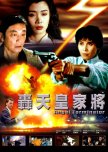
Esta resenha pode conter spoilers
Angel Terminators was a dark entry in the Girls with Guns genre. With the exception of Kenneth Tsang's Big Bad, the predominant cast members were all women---Sharon Yeung, Kara Hui, Carrie Ng, Nishiwaki Michiko, and Cheng Yuen Man. There was plenty of action and misogyny to go around. Not as coherent as Michelle Yeoh's 'Yes Madam' it still had enough kung fu and gun play to satisfy people who enjoy the genre.The film started out clumsily with a car chase and gun fire. Ida and Hon seem to always be in the neighborhood when super cops are needed to bring down bad guys, including a kindergarten being held hostage by jewelry thieves. As Hon is leaving on a plane for Scotland to further her training, Sawada is landing. Sawada has been in Thailand for seven years to avoid being arrested. He has come to town to reclaim his drug and criminal territory. Ida's snitch, a prostitute named May, feeds her intel about Sawada's huge drug deal going down. The cops arrive and a ferocious shootout ensues. Sawada has a mole in the police department who helps him set up an ambush for Ida in retaliation for her interfering in his business. The mole is a gambler who happens to be married to Carrie, Sawada's former lover. Before long Ida and Carrie are in dire trouble when they find themselves in the frightening clutches of Nishiwaki.
Firearm acuity was not the movie's strong point. The opening shootout showed shooters trying to push the bullets out of their guns or closing their eyes when shooting. Another time when the police had the high ground and the bad guys surrounded they still managed to miss most of the baddies. Sharon could hold her own in the fists and kicks fight department and make the moves believable even when they defied gravity. Ida could have beaten the Olympic pole vault record by about twenty feet. With kung fu veterans like Alan Chui Chung San and Dick Wei, Sharon always had an accomplished opponent to spar with. Jacky Chen designed several creative fights though I don't envy the stuntmen who took some hard falls. The Hong Kong police department in the movie was going to need a hiring push after a significant portion of its police officers were mowed down.
This film would have been more entertaining if they'd left the Very Special Episode about Drug Abuse out of the middle section. I also deducted points for a scene where Sawada urinated all over Carrie, the woman he supposedly loved. It was disgusting and unnecessary. When the film focused on Sharon and Kara, either their friendship or when they fought the baddies together it was at its strongest. The two women had nice chemistry together and I fail to understand why they split them up for much of the movie. Angel Terminators kept the action and adrenaline pumped up, never slowing down to let the writer put together a more coherent plotline. The ending was bonkers and baffling. Only for Girls with Guns fans or old kung fu addicts.
9/27/23
Esta resenha foi útil para você?
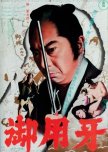
Esta resenha pode conter spoilers
"Something big is behind this!"
In the 1970's sexploitation was rampant and Hanzo the Razor was an excellent example of it. Despite the copious amounts of spewing blood and overall lightheartedness, the underlying theme that rape is okay and something to be enjoyed has aged badly in a world where women now have a say and are able to write critiques.*Because of the nature of this movie, I use some male anatomical terms*
Hanzo is honorable and incorruptible, a pike in his higher up's sides as he berates them for accepting bribes. After his confrontation over oath taking Hanzo has himself tortured so that he will know how prisoners feel and then pounds his penis with a wooden stick. After that he works it out in a burlap sack filled with raw rice. When he has thoroughly exercised his third leg which had to have been at least 18inches/47cm long, seriously how did he not pass out from all his blood headed south, he stumbles across a clue that Kanbei the Killer has escaped his banishment. He frames Kanbei's lover who is now his boss' mistress for murder and hauls her in for "questioning." Omino is stripped and bound. Hanzo begins his special interrogation of Omino with his Mr. Winky, stopping intermittently so that she will answer questions and beg him to continue. He later questions another woman while she is hanging from a net giving an all new meaning to the term 'whirlibird'. She, like Omino, was sent into the throws of ecstasy from his huge and talented member and told him everything he wanted to know.
The case showed the corruption of the court and magistrate's office, but the case itself was limp. It simply gave Hanzo the opportunity to cause some spewing blood deaths and chances to interview women with his super ding-a-ling. The thing to keep in mind about the women he interrogated is that they hadn't committed any crimes. One might have been harboring a fugitive, but by that time the fugitive was dead. As much as he worked Little Hanzo out, it made me wonder how many women he questioned a week. Did he interrogate male suspects the same way? Kung fu specialists learn to pull their equipment in, but apparently in Japan it's hardened into a weapon.
Hanzo the Razor, yeah I don't think they were talking about his sword, had some humorous moments. But the utter lack of consent and warped view of rape and women overshadowed anything positive about the film. Hanzo was known to be honorable and a man who protected the people. I'm just not sure how honorable rape is.
9/19/23
Esta resenha foi útil para você?
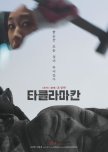
Esta resenha pode conter spoilers
Slow, non-linear story, but still engaging
Desert of No Return was a slow paced, non-linear (very non-linear) story about two people in dire financial straits who hooked up one night leading to tragedy. The film felt dragged out by bouncing back and forth in time and telling the story from both main characters' points of view. Soo Eun's story was far more compelling and Ha Yoon Kyung did a superb job bringing her to life.Tae Shik is a divorced father who lives with his mother and can't make ends meet providing for both households. He collects junk from sellers and illegally from abandoned houses. His ex-wife takes every opportunity to denigrate him as well as people on the street. He goes with a friend to a karaoke bar where girls are provided for companionship. Soo Eun wants to own a nail salon but is short of the cash needed. She is in a loving relationship with a female musician and promised to never sleep with the clients during the "second round." Tae Shik and a reluctant Soo Eun end up in a hotel room which sets a terrible chain of events in motion.
Tae Shik was a man incapable of properly handling adversity or confrontation. If there was any effort to make him sympathetic it did not work with me. The more I discovered about him the less I empathized with him. All I learned from the film was that even ahjussis can be deadly dangerous if provoked or steal from you when your back is turned. Soo Eun made a choice she paid for in multiple ways. Though she worked to be a good human being she lost everything due to a desperate decision. The film bounced not only between the two characters' points of view but also back and forth in time which could be confusing.
Tae Shik's story tried to explain his rage which Jo Sung Ha portrayed well. Ha Yoon Kyung brought out Soo Eun's vulnerable side as well as her fierce side. She was beautiful whether made up or sans free of makeup and gave a lovely performance as the doomed young woman. The music was quietly moving though I disagree with her lover, even musicians have to pay their bills.
I didn't particularly enjoy the first part of the film but found myself engrossed in Soo Eun's romance and story. Many synopses made her out to be a prostitute. I don't think one time brands a woman for life. I felt the ending was unsatisfactory, but that could be because I do like my endings tied up with a bow one way or another. Had the rest of the film felt as complete as Soo Eun's story I would have enjoyed it more.
9/19/23
Esta resenha foi útil para você?
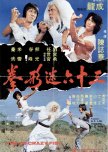
Better than a sleeping pill if you have insomnia
The first ten minutes of 36 Crazy Fists showcased Jackie Chan working with the actors in the movie. To be clear, despite many posters and VHS/DVD covers, he was not in the movie. He was the martial arts director and due to contractual issues was not allowed to act in it. He dodged a bullet.Wong Tai Kwong is befriended by two Shaolin monks when they rescue him during a fight. Turns out his father had been murdered by the gang for not paying protection money. The two monks talk their sifu into training him so that he can have his revenge. Most of the time Wong does chores and only when a passing drunk fights with him does he learn any kung fu. Eventually, he has to fight two thugs from the gang in duels and finally the Big Bad at the end. That's it. There was a lot of "comedic" subterfuge thrown in but the story was thin even by kung fu standards.
Aside from Ku Feng and maybe Chiang Cheng, everyone else was about as interesting as wallpaper paste. Tony Leung Siu Hung would go on to act in Ip Man. He also became a respected martial arts director, including working on Ip Man. But this was not Ip Man. This was not even a bad Jackie Chan movie. The acting was abysmal and the story was as slow and uninteresting as the fights.
But @Butterfly this was a movie with Jackie Chan as the martial arts director so the fights must have been great-right? Wrong. The fights were s-l-o-w. It was either kung fu posing or a bad kung fu dance off. The fights used many of the same poses over and over occasionally throwing in a back flip or two. The funniest bit in the whole movie was when they sped up Ku Feng having a meltdown and it made me wish I could do the same thing. Or that they would speed the whole movie up and let it be a Chipmunk Martial Arts Movie Special. At least if they'd sped the action up, the fights would have been normal speed. People missed their marks and one stuntman literally rolled under a fighter for him to jump over. The fights were painfully bad.
If the fights, story, and acting weren't bad enough, at one point they sent a prostitute into the monk's bedroom to blackmail him into training Wong. For way too long her bare breasts filled the entire screen as she shook them, and shook them, and shook them. I truly cannot think of one thing to recommend this movie. Unless you are on a mission to see anything Jackie was involved in or fancy watching the bouncing boobies, I'd avoid this disaster.
9/15/23
Esta resenha foi útil para você?

Esta resenha pode conter spoilers
"I don't have time to die"
When Jimmy Wang Yu jumped off the Shaw Brothers ship, he sailed to Taiwan and made seven films there in 1971. Blood of the Dragon aka The Desperate Chase was one of those films. This film boasted many Taiwanese regulars-Lisa Chiao Chiao, Yi Yuan, Lung Fei, and Miao Tian. The fights, as many were from this time, utilized weapons instead of fists and kicks.A young beggar is asked by a dying rebel to take a small bamboo container with a SECRET LIST to the prince. Jimmy Wang Yu's White Dragon uses his silver spear to save the boy when Lung Fei and his goons capture him to acquire the list. The White Dragon/Lung Tai and Ni Chiu take the list to the prince but are attacked as the prince is holding a grudge against Lung Tai. The prince uses a trick sword and Lung Tai's ambivalence about fighting the prince to wound the legendary warrior in white. Lung Tai and the boy escape to Lisa Chiao Chiao's restaurant where more bad guys are waiting to attack. After defeating or running off the bad guys all while bleeding copious amount of blood, Lung Tai explains that the hotheaded prince is actually a true patriot and at the top of the Secret List's names of rebels. The prince and Lung Tai make nice before Miao Tian and Yi Yuan bring their forces against the restaurant to retrieve the list.
I know that Wang Yu has been revered by kung fu fans but I've never cared for his acting. He tends to come across as stiff and smug and his fighting sluggish. I was pleased that he was looser in this film and his fighting quicker. Lisa Chiao Chiao didn't have much to do except wring her hands and stand around. You Long as Ni Chiu did a good job and thankfully the kid wasn't written as distractingly annoying as so many were. Miao Tian, Lung Fei, and Yi Yuan had limited scenes but could always be counted on to be properly menacing as the bad guys.
With the exception of one fight most of the fights were one man against several or many. Lung Tai had his silver spear, while the prince had a magic blade, Lung Fei had a chain with a blade covered metal ball, and Yi Yuan had a sword that could transform into a chain and back again. Yi Yuan's general also had the equivalent of throwing stars. The fights ranged from well done to sloppy. When the big groups were fighting against one, there were times that stuntmen flipped or fell back when they were nowhere near the action. Bodies being thrown or kicked far distances looked absurd even for a wuxia. You could also see at least one person tuck the spear under his arm when he was supposed to be run through with it. Overall, the fights and there were a lot of them, were entertaining with high stakes and numerous combatants.
More importantly than Jimmy Wang Yu for me was director/writer Kao Pao Shu. She was one of the very few women who had the chance to direct these masculine movies. I wish there had been stronger women in the film but we can't have everything. The White Dragon was an anti-hero, the lone loner who wanted to be alone, but when the chips were down could be counted on to stand up and fight for what he thought was right no matter the cost. The pace of the film kept it engaging as the swords and spear flashed almost continually.
9/15/23
Esta resenha foi útil para você?
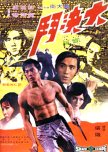
Esta resenha pode conter spoilers
Knife fights with a side of kung fu
The Iron Triangle of Ti Lung, David Chiang and Director Chang Cheh set aside kung fu for the most part and picked up knives instead for The Duel aka Duel of the Iron Fist. The grand duel foreshadowed from the start would pit allies against each other in a fight that could not be avoided.Set during the early part of the 20th century, Ti Lung's Tang Jen Chieh is the godson of a local Triad lord and brother to Ku Feng's Jen Lin. A hired killer, David Chiang's "Rambler," helps Jen Chieh when fights breakout. With buddy Hsiao Mao (Cheng Kang Yeh) they seek to protect Shen Tian Hung, but he is murdered during one of the huge brawls that begin the movie. Jen Chieh takes the fall for the fight, bids his girl Butterfly goodbye, and hides in the south until the heat is off. He returns home after numerous attempts on his life with only Hsiao and his now drunken brother on his side. The former accountant Kan has taken over the gang and is seeking his death. Jen Chieh is devastated to find that Hu Di/Butterfly is now a prostitute. With his world turned upside by treachery and death, Jen Chieh vows vengeance on those responsible.
The Duel's strength was the prickly bromance between Jen Chieh and the Rambler. Their complicated relationship gave depth to the impending collision. I've never been a David Chiang fan, but he and Ti Lung did have a nice chemistry together. I'm always happy to see Ku Feng, especially when he's a good guy. The problem I had with the movie was that the narrative felt poorly paced and needlessly confusing in others. Fortunately, the relationships between brothers and frenemies created a compelling movie when the plot lines didn't.
Tang Chia and Yuen Cheung Yan kept the fights interesting even when they were the few or the one against many. Close-ups were used which meant they couldn't have randomly flying bodies in a huge scrum. The slices and kicks were well timed and for a 1971 Hong Kong film---fairly fast. Instead of fists and kicks most of the fights involved knives or other sharp objects. The duel commenced after another free for all brawl in the rain with the two combatants wielding bamboo poles fighting in a puddle-filled courtyard. The death toll was high for this film, high even for a kung fu flick. I was disappointed that guns were brought in for the final battle. I don't mind trampolines, wires, and creative filming, but for me, guns don't belong in kung fu films. Because of the rapidity of skirmishes it was hard trying to distinguish the faces of the stuntmen extras and fighters-Chan Sing, Jason Pai Paio, and Yuen Woo Ping were among the many familiar names.
The Duel was an entertaining, if slightly different, film for the genre. The action rarely slowed down and the double crosses and revelations kept going until the end. Ti Lung and David Chiang displayed the special rapport that saw them through 20 films together. If you are a fan of old martial arts movies, this is one to try.
9/14/23
Esta resenha foi útil para você?
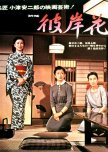
Esta resenha pode conter spoilers
"Can't I find my own happiness?"
Ozu once again examined how a traditional family was forced to confront modern thinking in relation to love and marriage. He did so in a humorous manner without wandering into the dark side as he was capable of doing. In Equinox Flower a father with two independent minded daughters found himself suffering in a sea of his own inconsistencies from which only the women in his life could save him.The film opens at the train station with a storm warning. If only the men in this film knew the storm of independent thought that was going to upend their lives. Hirayama Wataru gives an emotional toast at a young couple's wedding. He praises them for marrying for love because his marriage had been a pragmatic arranged marriage. Later that week an old friend visits him and asks him to check on his daughter, Fumiko, who has left home. She didn't want an arranged marriage estranging their relationship. Wataru found her working at a bar and in love with a musician, but happy and healthy. No problem there. One of his daughter's friends, Yukiko, asks for advice dealing with her mother who is always trying to matchmake for her. He tells her not to be in a hurry to marry. "You may think marriage is golden, but it can end up being brass." When she dreams of a love match-no problem. When a young man name Taniguchi comes to his office asking permission to marry his oldest daughter, Setsuko---big problem. He was not consulted and didn't even know they were dating. Without realizing it he begins to set into motion the kind of estrangement his friend had with his daughter. The women around him begin to mobilize in their own subtle and not so subtle ways to help him change his mind and give his blessing to the young couple.
Setsuko and Yukiko pinky swore to help deal with their domineering parents and Yukiko laid the perfect trap for Wataru. Wataru's youngest daughter, Hisako, pushed for Setsuko to have a love match knowing it would be her turn next. Kiyoko, gently nudged her husband to do the right thing, always believing that he eventually would. With four women against him he never stood a chance no matter how controlling and cantankerous he could be.
I had to remind myself numerous times that this was 1958 when Wataru dropped his clothes on the floor for Kiyoko to deal with, told her to turn the radio off like you would a child, and went drinking or on reunion trips with his buddies. He also grounded Setsuko and told her to quit her job because he was angry with her. Ozu's wives always seem terribly confined to the house with no social life whatsoever except caring for their husbands. Wataru worked late and spent time afterwards with male friends. Kiyoko stayed in the house with only a maid for company. When Kiyoko yearned for the days during the war when the family huddled together in the bomb shelters because they were actually all together, it was sad indictment on her life.
Ozu put color to good use in his first film to use it. While much of the settings were beige and gray, most of the men dressed in gray suits as well, he displayed bright pops of color in red, green, and blue. The women, with the exception of Kiyoko, often wore bright colored kimonos. His teapot (red) had a couple of closeups and trains also figured into the story as they usually did. I have never grown tired of his meditative compositions and framing of shots. The colors he chose were as soothing as they were in black and white. The only drawback to his style, for me, was as ever, the face nearly straight onto the camera framing which was jarring during dialogues because the characters were looking at me and not the character they were conversing with, bouncing back and forth like a ping pong.
Papa Hirayama came across like a 1950's man, one who was used to getting his way in everything at home. What was different was that the women in his life called him on it. Yukiko complained in the same way about her overbearing single mother and Fumiko refused to go home because her father wanted everything his way. The old tradition of a parent determining who their child would marry was giving way to the young people wanting to marry for love. And while Wataru could appreciate that for everyone else's daughter, he had trouble letting go of control of his own. Fortunately for him, the women in his life banded together to show him his own hypocrisy. He also learned when a woman said "it's fine" that he should not assume he had won the argument. Wataru was right though, it takes a lot of work to turn brass into gold in a relationship.
9/9/23
Esta resenha foi útil para você?
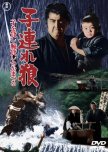
Lone Wolf and Cub: Sword of Vengeance
2 pessoas acharam esta resenha útil
Esta resenha pode conter spoilers
Samurai daddy take your kid to work day
Lone Wolf and Cub: Sword of Vengeance was the first in a series of movies about a disgraced ronin caring for his baby son while seeking revenge on the people who murdered his wife and framed him for treason. This ronin of few words left a trail of spurting arteries along with piles of limbs and decapitated heads.Ogami Itto was the honored executioner for the Shogun until one day the treacherous Yagyu clan decided they wanted his position for their clan. They murdered his wife and set him up on treason charges. The wily swordsman not only escaped the executioner's blade but won his freedom as long as he stayed out of Edo. Pushing a secret weapon laden baby cart, he had a sign reading "Sword for Hire" and "Son for Hire." No longer using his feared name, he and his son were now known as the Lone Wolf and Cub. An assassination job took him to a hot spring in a mountain village being terrorized by bandits. Playing a sheep looking after his lamb he found himself among captured travelers. It didn't take a fortune teller to know what the fate of the bandits would ultimately be.
Ogami had his own code of righteousness formed by his job and his responsibility to his son. It meant when he saw a woman being raped and her father murdered that he didn't step in, which didn't exactly grant him a halo. Nor did it stop him from servicing a prostitute in front of crowd in order to "save" her. A man's gotta do what a man's gotta do. Like other 1970's movies, there was plenty of sexploitation. Had they toned down the naked women and sexual violence I would have enjoyed this movie more.
This film felt like they were setting the table for more courses to come. I was surprised how quickly the movie was over and how little happened in the present as there was copious use of flashbacks. Wakayama Tomisaburo was an accomplished martial artist and his skill showed during the fights. At least the fights I could watch when I wasn't closing my eyes during the severing of limbs and buckets o' blood spewing everywhere.
Lone Wolf and Cub reminded me of the Mandalorian only with more blood and flying body parts. Ogami's son could have given Baby Yoda a run for his money in the cute kid with a lethal daddy department . If you can overlook the '70s sexploitation and are in the market for an old school gore fest samurai with a baby who is also seeking revenge film, this is it.
8/31/23
Esta resenha foi útil para você?
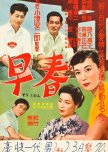
Esta resenha pode conter spoilers
"Everyone's dissatisfied"
Ozu explored the family life of a cog in a wheel salaryman. Sugiyama Shoji personified the endless, hopeless life of the literally white collared worker who made just enough to live on but not enough to get ahead, much less dream of something different.Shoji and Masako have been married for a number of years but after the death of their baby son have drifted apart emotionally. Shoji's family is now primarily populated by the people he works with, ex-army buddies, and mahjong companions. Masako has a widow neighbor and a jaded mother she can turn to. Due to Shoji's nighttime habits of mahjong and drinking, the couple are behind in their rent. The disaffected worker is about to knock Ozu's ubiquitous train off the tracks when he begins an affair with a younger woman named Goldfish.
Aside from A Hen in the Wind's male lead, Shoji was one of the most unsympathetic leads in an Ozu film that I've seen so far. He frittered away the family money, barely spoke to his wife and treated her like a maid. He brought drunk friends home to sleep it off and walked out one evening when he surprisingly came home early and dinner wasn't ready yet. To top it all off he scarcely covered up his affair which seemed cruel. His wife did all the laundry and he didn't think she'd notice the lipstick faithlessly adorning his clothing? He didn't think she would smell another woman on him when he sauntered in after having sex with Goldfish? When she finally did confront him, he tried to gaslight her and lied like a five-year-old. With the exception of one woman who told her to stick to her guns, others, including her mother, convinced her to apologize for her part in the marital estrangement and go back to her husband. Thankfully, Shoji did finally apologize to her, however with all the emotional depth of apologizing to someone you'd accidentally bumped into. As the husband in Hen in the Wind did, he wrapped up the story with a "let's start all over again" happy ending. Ozu banged on about how disillusioned salarymen were and largely blaming Shoji's infidelity on his employment dissatisfaction. Where was the insight into the grief Masako was obviously still dealing with and her loneliness? Where was the compassion for a lonely woman with a husband who spent most of his time away from home? Why did she have to apologize for her husband sleeping with another woman?
Ozu's composition and framing were as exquisite as ever. There were the typical scenes in an Ozu film with singing and game playing, occasionally both at the same time. The 2 hours and 24 minutes film dragged badly in places. How many drinking and singing scenes were truly necessary? The waxing on about the meaninglessness of a salaryman's life became repetitious. Over and over again, Shoji was shown spending time with just about anyone but his wife which began to wear thin. It was doubly painful because Shoji never mentioned loving his wife whereas numerous characters commented on Masako's love for Shoji. At no point did Ozu show the reason Shoji decided to turn his marriage around other than for convenience's sake which made the decision emotionally hollow.
Ozu's insight into the long hours and drudgery of death by overwork was stinging. The commentary on women with unfaithful husbands was disheartening. The nicest comment about wives was Shoji's older friend played by Ozu regular, Ryu Chishu. "No one is more dependable than a wife." Sounds like something you would say about a brand of tires or dishwasher. I didn't find the unfaithful and cold Shoji a compelling or sympathetic character. He was an irresponsible husband who did nothing to earn his wife's forgiveness. Ozu made many meaningful films, for me, this wasn't one of them.
8/29/23
Esta resenha foi útil para você?
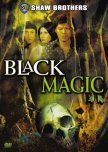
Esta resenha pode conter spoilers
Watch only if you have a strong stomach
In the 1970's movies and television dug into the occult and often mixed it with a little sexploitation. Black Magic was one of those movies. The movie boasted a strong Shaw Brothers cast-Ti Lung, Lo Lieh, Tien Ni, Ku Feng and Lily Li. It also had a host of slimy creatures. You'd need a strong stomach to watch it.Ku Feng played the Black Magic magician with a laughable gray wig. Lo Lieh loved Tien Ni's money so he needed her to fall in love with him. Tien Ni was in love with Ti Lung's body and needed him to fall in love with her. Ku Feng wanted to sleep with Tien Ni. Finally, Ti Lung and Lily Li had a wholesome love that was definitely going to get messed up by all the lust and greed in the air. The Black Magic started flowing and nobody ended up with exactly what they desired. Fortunately, Ku Wen Chung played a good priest who helped sort things out by the end.
There were plenty of dead bodies, nude bodies (some writer had a fetish about women expressing breast milk), snakes, worms, centipedes and other vile bits. I'd have to include Ti Lung's horrible wig among the scary objects. The only thing that caused me to rate this as high as I did was the hilarious finale where good and evil fought it out with cheap 1970's special effects and sound effects on top of a building scaffold. I watched it on my quest to see all of Lo Lieh's movies. Other than that, I couldn't recommend unless you enjoy films with all of the above.
8/26/23
Esta resenha foi útil para você?
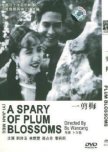
Esta resenha pode conter spoilers
"One who readily falls in love can hardly be a faithful lover"
A Spray of Plum Blossoms was a modernized and loose adaption of Shakespeare's first play, The Two Gentlemen from Verona. This is one of only seven Ruan Ling Yu films readily available and while her part is relatively small, she still makes the film worth watching. The silent version I watched used Shakespeare's names for the characters and I will do the same in this review.400-year-old spoilers ahead! Valentine and Proteus are friends from military school. Proteus falls in love with Valentine's sister Julia and vows to take care of her while his friend leaves for a post at Guangzhou. Upon Valentine's arrival he falls in love with the general's daughter Silvia, who reciprocates his feelings. In time, Proteus is assigned to the same post but he doesn't leave before declaring his undying love and fidelity for Julia. Proteus arrives at the post in style via a bi-plane. Proving he truly is the General of Perfume he immediately falls in love with Silvia.
Proteus betrays his friend, causing the General to discharge and exile Valentine. Proteus has competition for Silvia in the form of Thurio, another soldier vying for her hand and the general's favor. Silvia refuses both as her heart has already been given to the disgraced Valentine. When Julia finds out that her brother is in trouble, she travels to the army post and confronts Silvia not about her brother but about Proteus. Silvia convinces her that she isn't in love with him and that he is the reason for Valentine's predicament. Silvia and Proteus take a horse ride together so that she can make him confess. He does but then tries to rape her. Thurio rescues her but has the same violent impulse that Proteus had. Fortunately, the Plum Blossom Bandit who is Valentine in disguise saves her. The next day she and Julia (who is dressed as a male soldier) are captured by bandits on a ride into the countryside. They are brought to the Plum Bandit and the women and Valentine are reconciled. Along with the bandits they set a trap for Proteus. After being confronted by Valentine he confesses his crimes and attempts to shoot himself but is thwarted by Valentine. General Sze arrives and Proteus confesses to him as well. Valentine and Proteus make up even though Proteus tried to rape his girl and had him exiled. It's implied that Proteus and Julia get back together and everyone is one big happy family.
I had hoped that this film would avoid Shakespeare's misogynistic 'bros before hoes' ending. At least Valentine didn't offer Silvia to Proteus in this film. Aside from the unsatisfying ending, I enjoyed this tale of true love, friendship, betrayal, villainy, and without earning it-reconciliation. Ruan and Jin Yan always had a nice chemistry, even if they were playing siblings. Lin Chu Chu as Silvia gave a wonderfully spirited performance as the woman who was loyal to Valentine and to her new friend Julia. It was an interesting take on the military with women leading the men and in uniform in various situations.
The existing film that I watched had been cropped. The words on the intertitles were cut off on the left and bottom. At other times, the film was damaged making it hard to read the light words. There was no music. I've watched enough silent scoreless films that the lack of music doesn't even register anymore. This film felt very ambitious compared to other silent films. Though the core cast had most of the lines there were numerous extras. Silvia's plum blossom room came across very stylistic. Aside from the military camp, the characters were filmed in what would have been beautiful, wide scenery. Silvia escaping on horse with the dastardly Thurio right behind her was exciting and well shot.
I think Shakespeare would be pleased that his play was first made into a move in 1931 and is still available nearly 100 years later. He might have had to get used to the idea of women as actresses but I think Ruan Ling Yu and Lin Chu Chu could change his mind.
8/26/23
Esta resenha foi útil para você?
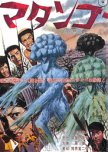
Esta resenha pode conter spoilers
"This yacht will never sink, it cost a lot of money" Wanna bet?
The 1960's were a fun time for monster movies, case in point this film---Attack of the Mushroom People AKA Matango. The film boasted alums from Godzilla and Kurosawa movies, not a bad way to build a cast for a dark movie about survival on a nightmarish jungle island.For an older generation or ones who've spent time watching TVLand, see if this sounds familiar---The movie begins with a jaunty tune as seven people frolic on a yacht. A millionaire, the skipper, first mate, television star, professor, and naïve young woman become stranded on a remote island after their yacht is blown off course during a terrible storm. Gilligan didn't have a writer on his island but this island does and this first mate was far more deadly and lecherous than the Skipper's little buddy. Too bad the professor's field was psychology or maybe he could have made a phone out of mushrooms as there were no coconuts to be found.*
The survivors found another ship run aground near the island with a captain's log stating to not eat the mushrooms. Given that the mysterious ship had been studying the effects of radiation on plants and animals, it left the door open that the mushrooms on the island (mushroom cloud?) might have been a scientific disaster either theirs or someone else's. Strange, colorful fungi covered the surfaces in the rooms of the wreck. Human nature began to rear its ugly head as fear and the lack of food chafed on everyone. The class divides fractured causing friction from the top down. Money was of little use when a person was starving.
"The weak constraints of society disintegrate in the face of the will to survive in harsh circumstances."
As polite society broke down and despair prevailed, the survivors slowly succumbed to eating the mushrooms, leading to a terrible fate. We know that the professor survived for he was shown in the opening shot, confined to a psych ward. After the grim transformations of his friends and acquaintances, he was left wandering if he should have stayed on the island as Tokyo could be even more cruel.
Matango built the story slowly, focusing on the different characters and showing their strengths and slow decline as hope withered away. It was fun seeing Koizumi Hiroshi have a nice meaty role after all the Godzilla films he worked in. This film included actors from both Godzilla and Kurosawa films, as director Honda worked in both. The acting was hit or miss with the cast, but the writing for them was stronger than most Kaiju or other monster fare from the era. The story grew darker as civility slipped away with hunger and desire taking hold. The mushroom creatures were typical 1960's people in rubber suits, but disturbing enough. The music and fog set the stage for a creepy tale to unfold.
Unlike the castaways on Gilligan's island Matango's castaways were jealous, lustful and murderous, mortal sins only heightened by the psychedelic fungi. The need to drift away into hallucinations instead of fighting to survive slowly dragged most of the castaways down, transforming them into the fungal creatures. Hunger can drive a person mad but so can monstrous psychedelic mushrooms. Attack of the Mushroom People was a mind-bending study of how people behave when societal norms collapse and when they lose the will to fight or even live.
8/24/23
*My comparison to Gilligan's Island was for fun, keeping in mind that Gilligan premiered in 1963 a year after this film.
Esta resenha foi útil para você?
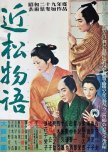
Esta resenha pode conter spoilers
"People's fates take such strange turns"
Going into a film titled The Crucified Lovers, it was a safe bet that the romance was not going to be filled with sunshine and roses. Mizoguchi took the 17th century ideals of honor and tradition and tore them open exposing the hypocrisy and cruelty underneath.Osan was a young woman married to a man thirty years her senior. Ishun was a wealthy owner of the printing company that supplied the Imperial court with calendars. Mohei was Ishun's right hand man who was nearly worked to death in his job. Otama served the family and was the target of Ishun's unwanted nightly advances. Though Ishun offered Otama her own house, spent lavishly on court officials and loaned important people large sums of money, he was unwilling to spare what amounted to pocket change to Osan's brother to save the family home. His miserly short-sightedness and lecherous ways along with Osan's brother's spendthrift habits would bring down both families while blaming it on others.
When Osan and Mohei were caught together in a completely innocent situation, Ishun accused them of adultery and ordered Osan to kill herself. He planned to have Mohei arrested for stealing his seal. The situation played right into Ishun's plan to rid himself of Mohei who was Otama's love interest. Mohei escaped and Osan fled, incidentally meeting up later. After attempting to leave the area with men on their trail, they decided to commit suicide at a lake. When Mohei confessed his love for her, she returned it and decided to live. Much of the rest of the film played out like The Fugitive with the couple on the run, constantly being chased. They were turned away by family who feared culpability in their crimes. Ishun wanted the situation handled quietly so his business would not be ruined by scandal. What he didn't know was that his own traitorous worker was feeding information to his rival. After the couple was captured and refused to be parted everything came unraveled for the master printer. Not only did his rival revel in his downfall, but the many noblemen who owed copious amounts of money to him hastened his ruin. The lovers went to their doom hand in hand serenely smiling finally free from the cruel constraints of the world they lived in.
Mizoguchi framed much of the film in tight restrictive spaces. Only when the lovers committed to staying together in the mountains did the spaces open up freeing them to breathe. Kagawa Kyoko was ethereal as the traditional wife, Osan. As Osan was forced to live on the run, Kagawa showed her fear, despair, and then a love that lifted her spirits above their dire situation. Hasegawa Kazuo was 23 years older than Kagawa but was able to convey the loyalty to his master's family and his conflicted love for Osan as well.
The lovers were not only guilty of adultery but also crossing class lines which was a serious violation in and of itself. The hypocrisy that men could sleep with anyone they wanted while a woman caught in adultery was literally crucified if her husband didn't kill her first was brought to the fore. As the female servants reacted to two lovers being paraded to their deaths, they wondered what horrific crime they had committed to suffer one of the most awful deaths. They hadn't killed anyone. While Osan and Mohei were initially innocent, Ishun's activities were reprehensible from the start. Had Ishun been willing to pry his purse open for a family member and kept his hands to himself, this entire tragedy might have been avoided. No one seemed to care about Osan and Mohei's fate, compassion was far outweighed by a rigid class and social system that had no room for error when it came to misbehaving women.
The Crucified Lovers aka A Tale from Chikamatsu ran the gamut of emotions as Mizoguchi tackled social traditions and gender rules. Beautifully filmed and well-acted, the tragic story of two falsely accused people who briefly found love and happiness across class lines and on the run was a challenging but rewarding film to watch.
8/23/23
Esta resenha foi útil para você?

O Tigre e o Dragão: A Espada do Destino
2 pessoas acharam esta resenha útil
Esta resenha pode conter spoilers
"All this for a sword"
Crouching Tiger, Hidden Dragon was epic storytelling and my highest rated wuxia. For this sequel without Ang Lee and being a Netflix release, I lowered my expectations and was not disappointed. Sword of Destiny was smaller in scope and storytelling, but still a fun movie. Yuen Woo Ping shot it like a more traditional wuxia, albeit with a bigger budget. More than that Michelle Yeoh and Donnie Yen reteamed again (loved them in Wing Chun!), and that was enough to make my martial arts loving heart beat with love.Yu Shu Lien thought long dead returns to mourn Sir Te and helps his son secure the legendary Green Destiny sword. The evil and ruthless Hades Dai, wants to rule the martial world and is determined to have the Green Destiny for himself. Silent Wolf, whose rumored death was greatly exaggerated puts together a team of five martial artists from the Iron Way to help protect the sword. Thrown into the battle is Snow Vase, a young martial artist who wants the sword to kill Hades Dai and Wei Fang, a young martial artist who works for Hades and has been tasked with stealing the famous sword. They have a connection that will draw them together all under the watchful eye of Shu Lien. While the warriors work together to keep the sword and each other safe, Shu Lien must decide if she can forgive Silent Wolf for his past mistakes.
The movie was only around ninety minutes long and relied heavily on Michelle Yeoh's and Donnie Yen's chemistry. The supporting characters were not given enough time to be fully developed on either the good guys' side or the bad guys', yet they were archetypes from the genre which gave the viewer a shorthand of what to expect from them-the lone warrior, loyal martial artists, a blind witch, ruthless evil fighters, etc. Snow Vase and Wei Fang were the young warriors who had to find their redemption and way along with a little flirting under the guidance of Shu Lien and Silent Wolf.
The fights were all well-choreographed which was to be expected by Yuen Woo Ping. Was there high-flying action? It was a wuxia, so you betcha! Whether it was Michelle fighting an ambush in the forest, Donnie nonchalantly taking out a gang of hotheads at a tavern, or a spectacularly filmed fight on a thawing frozen lake, they were all outstanding thanks to Michelle and Donnie's experience. Michelle still had a quickness and fluidity that made her captivating to watch. Donnie brought a playfulness and solemnity to his fights depending on the opponent. Watching these two veterans fight back-to-back brought me sheer joy. I loved that there was a tower for the final battle. It brought back memories of Cheng Pei Pei (Jade Fox) having to confront the bad guys with their tower in one of her old movies. And the ubiquitous outdoor tavern from many an old kung fu movie was the perfect setting for the audience to meet Silent Wolf and the Iron Way fighters.
Michelle Yeoh has a regal bearing and elegance that cannot be duplicated. Her expressive face and voice pull you into her character. Only she could make a line like "You will not find it there nor take it from here" believable. Much has been made of the movie being filmed in English and later dubbed with Mandarin. Selfishly, I'm happy it was. There was ferocious backlash over Michelle's accented Mandarin in the original. I tried watching the dubbed version of Sword of Destiny but the professional Mandarin voice actress sounded incredibly generic and flat, sapping all the energy and nuance out of Yeoh's performance. I find Michelle's voice acting essential to her performance and was relieved to hear it in the English version. Maybe it was the wig or makeup but Donnie has never looked better or more romantic than in this film. And as you would expect of him, he handled the fight scenes splendidly. Harry Shum gave a complex performance as the young warrior at a crossroads in his life. The weakest performance of the main characters was Natasha Liu Bordizzo as Snow Vase. This appeared to be her first role and it showed. Finally, Jason Scott Lee made for a sinister villain, even if he wasn't given much to do. This was a Chinese and Hollywood/Netflix amalgam, and an international one at that, with actors from Malaysia, Hong Kong, the USA, Australia, China, Korea, New Zealand, and Vietnam. How you feel about a multi-national cast in a kung fu staple may affect your viewing pleasure.
For me, I can look at this film as completely separate from the original. It was not a perfect film, but for the genre it was quite good, I've watched my share of terrible ones. It did take some time to alter my perception of it being in English and not Mandarin or Cantonese, which did take away the authentic feel to it. There was a bit of cheese in it, but the original had its share, too, most wuxias do. The cinematography was nice, fights were solid, the scenery was beautiful, the OST felt integral to the story, aside from that ugly green sword-the props, sets and costumes were excellent, and most of the acting was acceptable to exemplary. Most of all it entertained me. I have watched this film numerous times and still enjoy it upon each viewing. I'm able to watch Michelle Yeoh and Donnie Yen once again fighting side by side which makes this a winner in my book.
8/4/23
Esta resenha foi útil para você?

 55
55 217
217 11
11






















